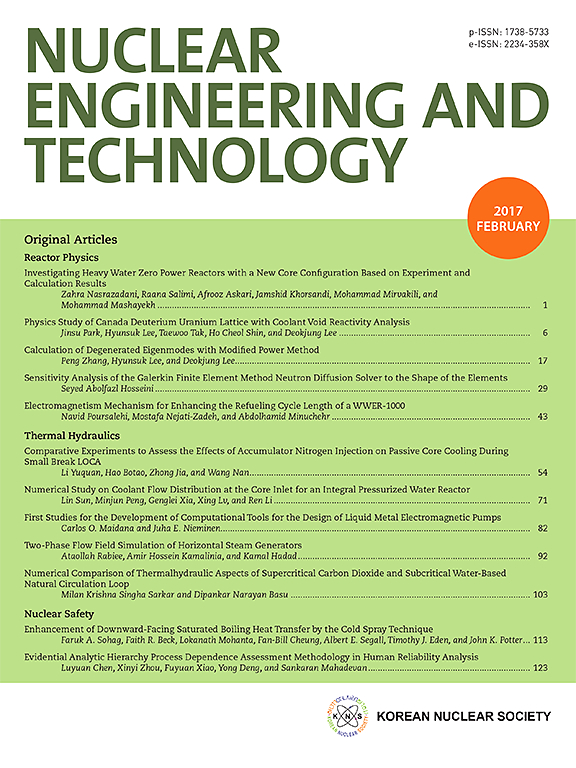体外中子辐照大鼠模型中的通量-剂量转换系数
IF 2.6
3区 工程技术
Q1 NUCLEAR SCIENCE & TECHNOLOGY
引用次数: 0
摘要
为了评估中子辐射效应,我们使用蒙特卡洛 N 粒子代码(MCNP)计算了能量小于 20 MeV 的中子的通量-剂量转换系数,该系数基于开发的大鼠模型。在左外侧、右外侧、背-腹侧和腹-背侧四种不同的辐照条件下,分别对能量范围为 10 MeV 至 20 MeV 的 27 个单向单能中子束进行了计算。研究中提出了选定器官的中子辐照剂量转换系数,可用于确定大鼠在外部中子辐照实验中的器官剂量。这项工作的结果与已发表的基于小鼠模型的数据进行了比较,以研究体型和体重差异对中子器官剂量的影响。比较结果表明,与小鼠模型相比,大鼠模型的通量-剂量转换系数具有相似的能量依赖性和对辐照条件的敏感性,而个体的体重和体型差异会因中子能量、辐照条件和器官位置的不同而导致不同程度的中子器官剂量差异。本文章由计算机程序翻译,如有差异,请以英文原文为准。
Fluence-to-dose conversion coefficients in a voxel rat model for external neutron irradiation
Fluence-to-dose conversion coefficients based on a developed rat model have been calculated for neutrons with energies <20 MeV using Monte Carlo N-particle code (MCNP), for the purpose of neutron radiation effect evaluation. The calculation was conducted respectively for 27 monodirectional monoenergetic neutron beams in the energy range 10−9 MeV to 20 MeV, under four different irradiation conditions: left lateral, right lateral, dorsal–ventral and ventral–dorsal. The neutron fluence-to-dose conversion coefficients for selected organs were presented in the study and can be used to determine the organ dose of the rats experimentally exposed to external neutron irradiation. The results in this work were compared with the published data based on a mouse model to investigate the effect of size and weight difference on neutron organ dose. The comparison results showed the fluence-to-dose conversion coefficients of the rat model have the similar energy dependency and sensitivity to irradiation conditions compared with that of the mouse model, and the weight and size difference in individuals could lead to different levels of neutron organ dose difference depending on neutron energy, irradiation conditions as well as the location of organs.
求助全文
通过发布文献求助,成功后即可免费获取论文全文。
去求助
来源期刊

Nuclear Engineering and Technology
工程技术-核科学技术
CiteScore
4.80
自引率
7.40%
发文量
431
审稿时长
3.5 months
期刊介绍:
Nuclear Engineering and Technology (NET), an international journal of the Korean Nuclear Society (KNS), publishes peer-reviewed papers on original research, ideas and developments in all areas of the field of nuclear science and technology. NET bimonthly publishes original articles, reviews, and technical notes. The journal is listed in the Science Citation Index Expanded (SCIE) of Thomson Reuters.
NET covers all fields for peaceful utilization of nuclear energy and radiation as follows:
1) Reactor Physics
2) Thermal Hydraulics
3) Nuclear Safety
4) Nuclear I&C
5) Nuclear Physics, Fusion, and Laser Technology
6) Nuclear Fuel Cycle and Radioactive Waste Management
7) Nuclear Fuel and Reactor Materials
8) Radiation Application
9) Radiation Protection
10) Nuclear Structural Analysis and Plant Management & Maintenance
11) Nuclear Policy, Economics, and Human Resource Development
 求助内容:
求助内容: 应助结果提醒方式:
应助结果提醒方式:


